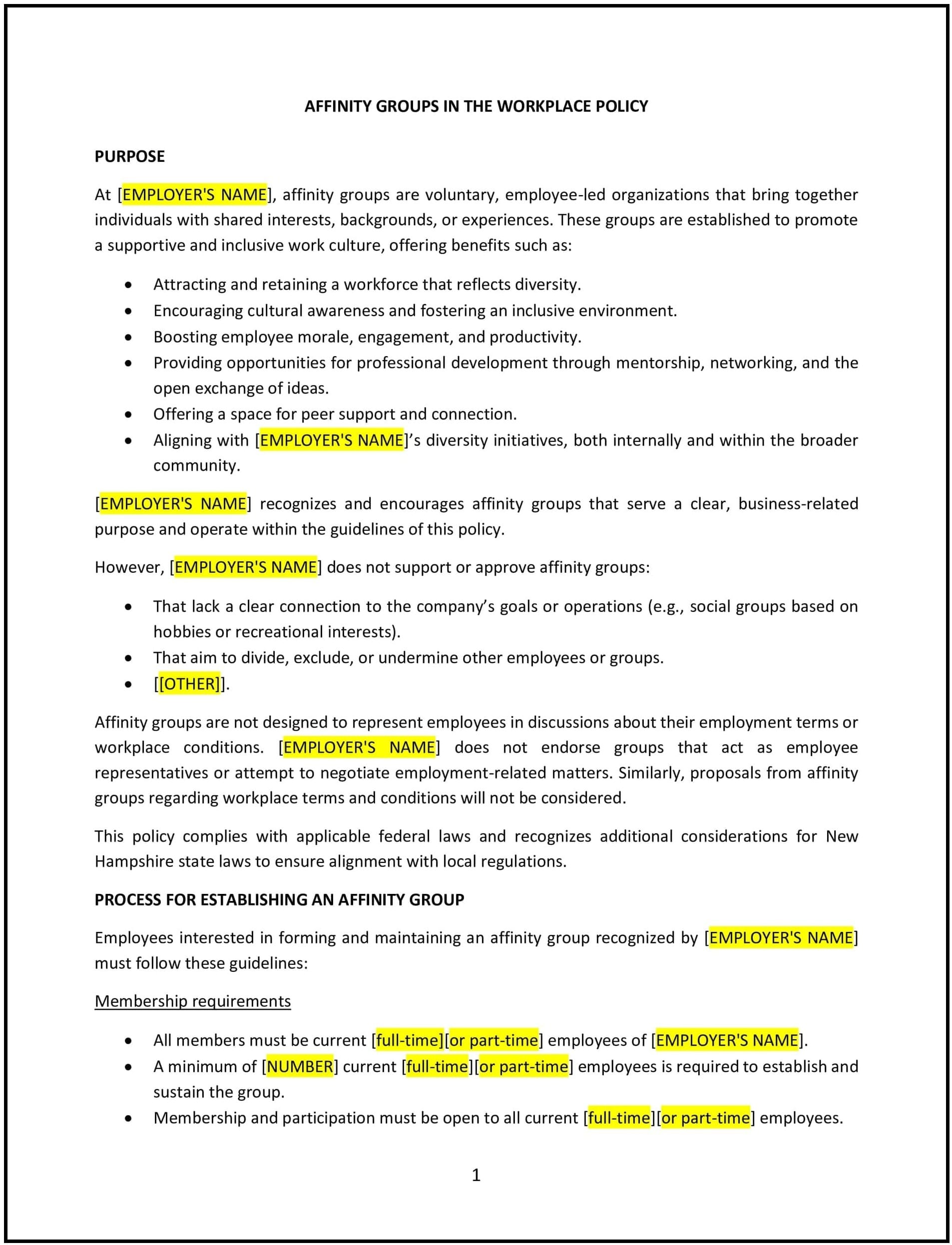Affinity groups in the workplace policy (New Hampshire): Free template
Got contracts to review? While you're here for policies, let Cobrief make contract review effortless—start your free review now.

Customize this template for free
Affinity groups in the workplace policy (New Hampshire)
An affinity groups in the workplace policy helps New Hampshire businesses support employee-led groups that foster inclusivity, networking, and professional development. This policy outlines how businesses can facilitate these groups while maintaining a productive and welcoming work environment. It also provides guidelines for forming, managing, and supporting affinity groups in alignment with workplace goals and company values.
By implementing this policy, businesses in New Hampshire can enhance workplace culture, support diversity and inclusion efforts, and encourage collaboration among employees.
How to use this affinity groups in the workplace policy (New Hampshire)
- Define affinity groups: Clearly outline what affinity groups are, their purpose, and how they contribute to the workplace.
- Establish group formation guidelines: Specify the process for forming an affinity group, including eligibility requirements and approval procedures.
- Set participation expectations: Ensure all employees understand participation is voluntary and that all groups must promote inclusivity and professional respect.
- Provide business support: Detail what resources the business may offer, such as meeting spaces, funding, or leadership support.
- Clarify governance and leadership: Explain how groups should elect leaders, conduct meetings, and report on activities.
- Align with workplace policies: Ensure affinity groups operate within existing workplace policies and company values.
- Encourage collaboration: Promote interaction between affinity groups and business leadership to align initiatives with business goals.
- Monitor and evaluate: Establish a review process to assess the effectiveness and impact of affinity groups on workplace culture.
Benefits of using this affinity groups in the workplace policy (New Hampshire)
This policy provides several advantages for New Hampshire businesses:
- Encourages inclusivity: Supports a workplace culture where employees feel valued and respected.
- Strengthens professional networks: Helps employees connect with colleagues who share similar experiences or professional interests.
- Enhances employee engagement: Provides opportunities for employees to take part in initiatives that align with their interests.
- Supports retention and morale: Employees who feel connected and supported are more likely to stay with the business.
- Aligns with business goals: Helps integrate employee-led initiatives into broader workplace culture strategies.
- Fosters leadership development: Gives employees opportunities to take on leadership roles within affinity groups.
- Provides structured guidance: Ensures affinity groups operate effectively while maintaining a positive and productive work environment.
Tips for using this affinity groups in the workplace policy (New Hampshire)
- Clearly define expectations: Outline the scope and purpose of affinity groups to maintain alignment with business values.
- Support collaboration: Encourage groups to work together on initiatives that enhance workplace culture.
- Promote open participation: Ensure all employees understand that affinity groups are voluntary and open to interested participants.
- Provide leadership opportunities: Encourage employees to take on leadership roles within their groups.
- Communicate policies regularly: Share guidelines with employees to clarify how affinity groups function in the workplace.
- Review periodically: Assess how affinity groups contribute to workplace engagement and make adjustments as needed.